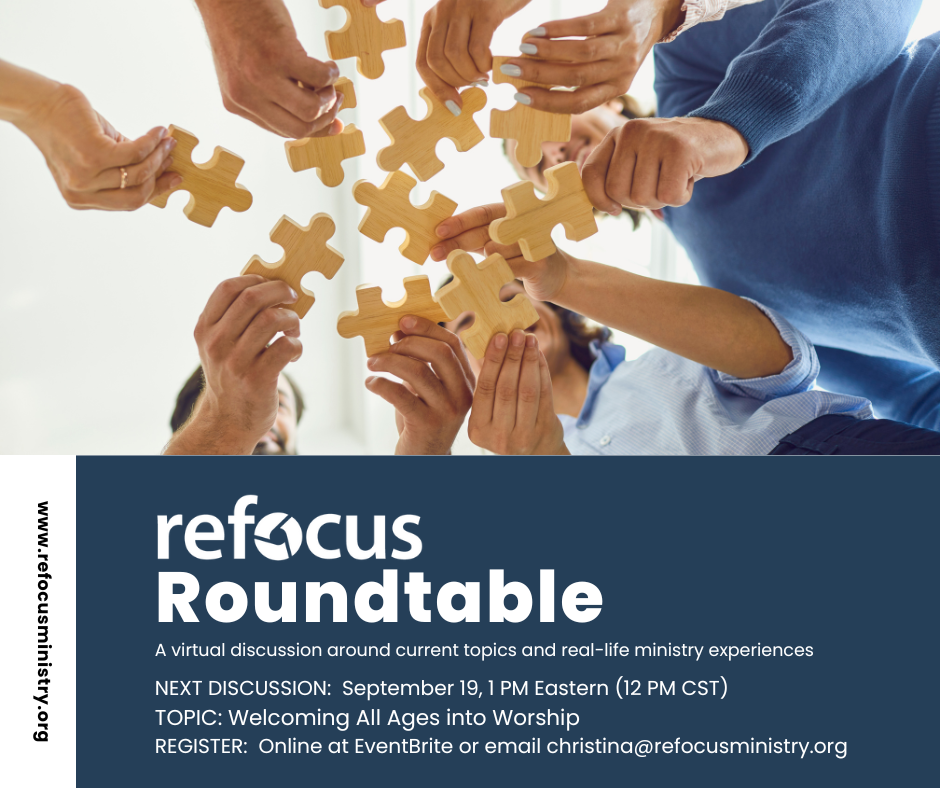It’s a request I see posted fairly often. It goes something like this: “Looking for a user-friendly curriculum. Video-based preferred. Something easy for volunteers, low-prep and easy-to-follow. We don’t have a huge budget so free or low-cost a must.”
There’s nothing inherently wrong with this request, but the request itself reveals some underlying concerns about how we approach children’s and youth ministry on Sunday morning or during mid-week.
- Restriction of Budget – This concern has two fronts; first, that larger churches don’t often give these ministries enough of a budget to adequately meet the needs of the ministry and second, most high-quality, resource-rich curriculum is priced too high for small churches on a shoestring budget.
- Reliance on Volunteers – Most children and youth ministries are primarily run by volunteers and those are not generally easy to come by. Need for volunteers always ranks high in lists of stressors for children’s, youth, and family ministers. As a result, one of the “selling points” that is often used is “Don’t worry. It’s really easy to use the curriculum. Everything will be prepped for you. You don’t really need to do much, just make sure the kids are occupied. There’s even a video for the lesson so you don’t need to worry about teaching.”
- Significance of Ministry – While almost every church with a children’s or youth ministry will inevitably state on their website that these ministries are of high importance to the church, the actual weight of the spiritual formation of children and youth within the church tends to fall on a few volunteers and one or two staff members and, due to the previously stated limitations, there’s a willingness to emphasize convenience to ensure that the ministry stays viable. In other words, to do literally anything to get volunteers and make sure that there is a kids’ ministry or youth group of some sort.

I think it is worth our time to take a second and consider this situation and ask some hard questions. To pause from the push to keep Sunday school going or youth group looking like youth group “should” look. To take a deep breath and consider if begging and pleading for volunteers and seeking out the easiest, most user-friendly curriculum is doing anyone, but most especially, our kids and youth, any favors?
Is there an alternative to the now-traditional approach to Sunday mornings and mid-week that would utilize the budget (whatever it is) in an impactful way, reduce the reliance on reluctant volunteers, and increase the significance of the ministry within the congregation?
I’m not a “one shoe fits all” kind of a person, but I do think in this case, there is an answer that could be not only transformative for the kids and youth but for the entire congregation.
Bring the congregation together. Bring the family together. Bring the generations together.
How would bringing the congregation together impact the concerns above?
Restriction of Budget
In his book, Youth Ministry That Last a Lifetime, Dr. Richard Ross advises approaching the youth ministry budget with a “Ministry in Thirds” mindset. One-third of the budget focused on parents and at-home discipleship, one-third of the budget focused on the whole congregation and establishing relationships between the youth and the church, and one-third of the budget on age-specific youth “Bible-drenched” activities. Why? Because these are three areas that young people who remained in church pointed to as integral to their discipleship. But how does spreading out an already minuscule budget help?
- Perhaps on Sunday morning, the kids and youth remain in the service, maybe helping to run the sound board or serve on the worship team or lead prayers or run the coffee bar, and the money that was once used on a budget-conscious, user-friendly curriculum is used on Sermon Notes for kids, a Kids Worship Team, Activity Packets, gift cards for coffee meet-ups with mentors, or tables and bulletin boards for coloring and displaying artwork. And the individuals who were once volunteers become mentors and Pew Pals and prayer partners.
- Or during mid-week, instead of splitting all the kids up into different ages and grades, the whole family stays together for a time of Family Faith Formation led by the children’s and youth pastor(s) where a meal is shared together and then the family worships around a table through shared discussion, learning, and prayer?
- Or maybe youth group meets bi-weekly instead of weekly and on the off week, engages in a service project or meets with mentors in small groups or joins a church small group or Bible study with other ages?
Reliance on Volunteers
Let’s be honest – it can be a scary thing to be asked to go into a classroom and teach a bunch of kids or hang out with a group of teens. It’s uncomfortable especially in today’s age-segregated culture and it can lead churches choosing to sacrifice quality teaching, tools, and theology in order to just get someone in the room. That devalues everyone involved but can actually be quite harmful for our kids and youth. But what if we offered less scary scenarios for our kids and youth to connect with the church and more opportunities like the ones listed above that don’t rely on a volunteer base?

- For instance, the Pray for Me campaign connects kids and youth up with prayer partners in the church, three for each child/youth, in order to help relationships based on praying for each other to form. There’s no pressure to teach or perform, simply pray. But the benefits of intercessory prayer on a community are innumerable (Source).
- What if your mid-week gathering was one where an older person came and shared a favorite hobby or activity with the group? Where the focus was simply learning from one another and being together, forming relationships that can lead to intentional discipleship?
- And what if we took it outside the walls of the church? What if we helped our older congregation members to find our kids and youth at their sporting events and dance recitals and spelling bees and show up as their biggest fans and loudest cheerleaders? What could that do to help break down the fears that might exists in being asked to lead a kid’s small group or teaching a youth Sunday School class?
Significance of Ministry
Perhaps most important of all, bringing the congregation and family together underscores the reality that spiritual formation and generational discipleship finds its home, not in a classroom or a curriculum, but in the people who make up the body of Christ.
If we are begging and pleading for volunteers, if we are so exhausted we can’t catch a break because every week is just getting classrooms covered or planning the next activity in hopes that kids and youth show up, if we are on the verge of burnout because we feel the weight of keeping a program afloat while also adding spiritual value to the lives of kids and teens… something is not lining up to our church’s stated values. Even if our best intentions and stated values are that these ministries are important, we’ve got to recognize a cultural change is needed, not a curriculum change.
Discipleship cannot be programmed even with the best, most-expensive curriculum. Relationships cannot be forged by coercing and begging volunteers into serving. Connection can’t be forged when healthy interactions aren’t even a possibility. These can only happen in community, bringing the congregation together.
“But that won’t work at my church!”
How do we know? What is the worst thing that could happen if we said, “I’m not willing to settle for just any curriculum because it’s easy-to-use and I can get volunteers to do it. I’m not willing to simply accept that I have to keep this program afloat at any cost regardless of whether it’s the best thing for the kids, the youth, or the parents. I’m not willing to let the budget dictate the significance of this ministry and the role the congregation and family play in raising lifelong disciples. I’m willing to risk it all for a chance of doing something so radical, so relational, and so real that these kids and youth will be indelibly formed by God’s love revealed in community with one another.”
Could it be worse than reducing children’s ministry to a user-friendly, budget-conscious, low-bar experience just to keep things going? Surely not. There’s so much richness to be had in the body of Christ. It has to be worth the risk.
FAMILY MOVIE NIGHT

Free Resource from ReFocus Ministry
Movies are great because they tell a story, much like the narrative of Scripture and the parables that Jesus uses to each his disciples. Often in movies, we can find rich plots, interesting characters, and complex moral dilemmas and in those things, we can often find just the right opportunity to share with our kids how we can live out our faith or how God can meet our deepest needs. Capture these moments with our FREE Family Movie Night discipleship guide; simply download the PDF, pick your next movie, and share a meaningful moment together as a family.
ReFocus Roundtable: What “Welcome” Means
A virtual discussion around current topics and real-life ministry experiences

Last month, over one hundred parents and ministers shared a personal story with us of their experience with a lack of welcome and/or a request to remove a child from worship. Several asked good questions about how to address this, how to be a place of welcome, and how to deal with challenging behavior.
This September, ReFocus is hosting an online roundtable discussion for anyone interested in exploring this idea of welcome, specifically welcoming all ages in our worshipping communities, and how we can do that well.
Register using the link below and join us as we consider together how we can create a place of welcome for all.

Now Scheduling: Fall/Winter 2023
Christina Embree is the founder and director of ReFocus Ministry. She holds a masters in ministry focused on Children, Youth, and Family Ministry and a doctorate in spiritual formation with a focus on age segregation and intergenerational ministry. In addition to coaching churches of multiple denominations and traditions all around the globe, Christina serves as the Minister of Generational Discipleship for the Great Lakes Conference of the Brethren in Christ and as a pastor at Plowshares Brethren in Christ in Lexington, Kentucky. She is widely recognized as a speaker and author in the areas of generational discipleship, intergenerational ministry, and family ministry. As the mother of three children, she is familiar with the challenges of faith at home and pastoral ministry. She along with her husband Luke share a love for the church, their community, and the global work of peace and restoration through Jesus.

